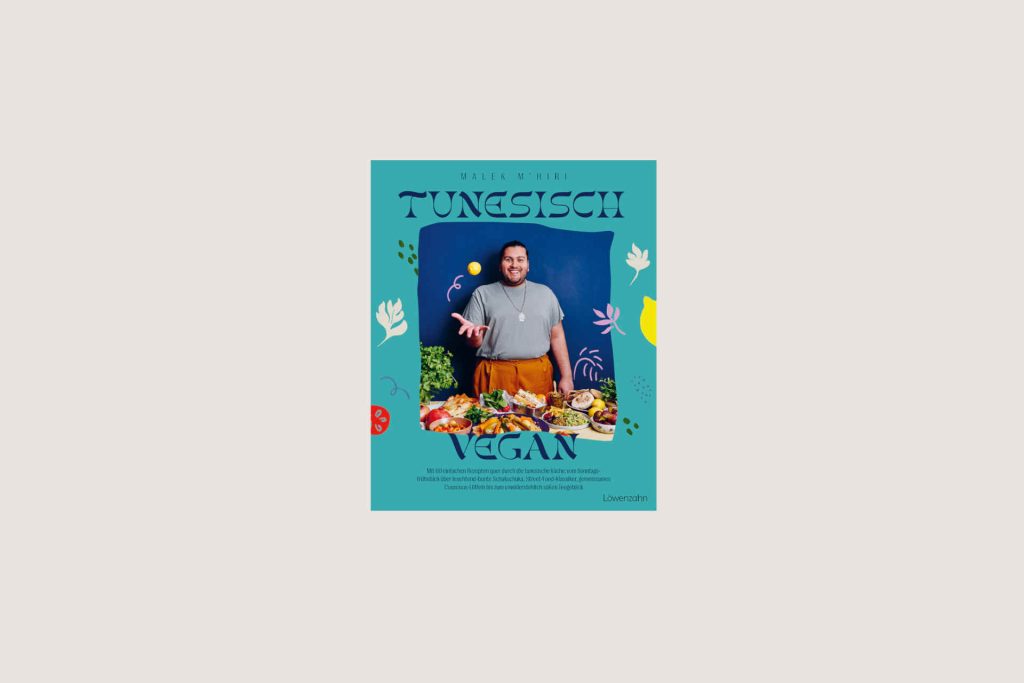| Editorial team
With “Tunisian vegan”, Malek M’hiri takes us on a colorful and aromatic journey through Tunisian cuisine – without any animal products. This book is more than just a collection of recipes: it tells the story of tradition, family and the unique flavors of Tunisia.
The 60 recipes show how diverse and creative Tunisian cuisine is, even in its plant-based form. Classics such as brightly colored shakshuka, spicy dumplings or steaming couscous become an experience through Malek’s vegan interpretations. The playful approach to ingredients and spices is particularly charming – there is less weighing up and more combining and seasoning. It is precisely this freedom that makes you want to discover the cuisine according to your own preferences.
The variety of recipes ranges from sweet Sunday breakfasts with millet pudding to hearty street food creations such as brik. Harissa, garlic and Tunisian olive oil play a central role and give the dishes their typical intensity. Malek not only conveys the recipes themselves, but also the knowledge of spices, ingredients and traditional methods of preparation.
The book’s personal touch is particularly impressive: the recipes are based on Malek’s family history and combine Jewish, Amazigh and Tunisian influences. This cultural depth makes each dish a piece of lived history that can be relived in the kitchen at home.
Info:
Löwenzahn Verlag
ISBN 978-3-7066-2990-4
160 pages
“Tunisian vegan” is a culinary experience that goes far beyond a classic cookbook. It inspires you to discover Tunisian cuisine in a new, plant-based way, combining tradition and modernity. Perfect for anyone looking for unusual recipes that tickle the palate and touch the soul. A real highlight for vegan and international cuisine!

When Mediterranean lightness meets Andalusian temperament, the result is a menu that is more than just an arrangement of courses: it becomes a narrative about origins, freedom, and the longing for new perspectives. In December 2025, two-star chef Álvaro Salazar from VORO in Mallorca will take over as guest chef of the month at Restaurant Ikarus – and take Salzburg on a sensory journey between Andalusia and the Balearic Islands.
“Porto – The Cookbook” by Sylvie Da Silva brings the flavors of the Atlantic city to life in book form. The focus is not only on the food, but also on the culture behind it – from hearty home cooking to delicate monastery desserts.
The work captivates with its mixture of recipes and travel impressions. Each chapter takes readers on an enjoyable journey of discovery – including stories about ingredients, regions, and people. The balance between culinary depth and emotional closeness is particularly successful.
INFO
Porto – The Cookbook
Author: Sylvie Da Silva
Publisher: Südwest Verlag
192 pages, approx. 120 color photos
ISBN: 978-3-517-10389-1
Price: €24.00 (Germany) / €24.70 (Austria) / CHF 33.50
Today, experiential dining is one of the strongest drivers of modern hospitality – emotional, sensual, and unforgettable. Formats such as Toni Mörwald’s PALAZZO in Vienna show how perfectly cuisine, culture, and staging can merge and why spending time together has become the most valuable luxury. “Better Together” exemplifies a trend that is shaping the industry and booming as a gift idea, especially at Christmas: enjoyment, entertainment, and shared amazement in an evening full of magic.


With “Tunisian vegan”, Malek M’hiri takes us on a colorful and aromatic journey through Tunisian cuisine – without any animal products. This book is more than just a collection of recipes: it tells the story of tradition, family and the unique flavors of Tunisia.
The 60 recipes show how diverse and creative Tunisian cuisine is, even in its plant-based form. Classics such as brightly colored shakshuka, spicy dumplings or steaming couscous become an experience through Malek’s vegan interpretations. The playful approach to ingredients and spices is particularly charming – there is less weighing up and more combining and seasoning. It is precisely this freedom that makes you want to discover the cuisine according to your own preferences.
The variety of recipes ranges from sweet Sunday breakfasts with millet pudding to hearty street food creations such as brik. Harissa, garlic and Tunisian olive oil play a central role and give the dishes their typical intensity. Malek not only conveys the recipes themselves, but also the knowledge of spices, ingredients and traditional methods of preparation.
The book’s personal touch is particularly impressive: the recipes are based on Malek’s family history and combine Jewish, Amazigh and Tunisian influences. This cultural depth makes each dish a piece of lived history that can be relived in the kitchen at home.
Info:
Löwenzahn Verlag
ISBN 978-3-7066-2990-4
160 pages